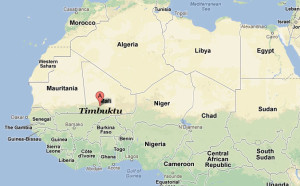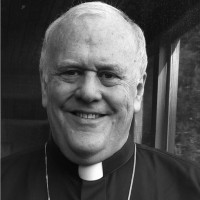Source: AAC International Update
The following is from the January 15, 2013 edition of the AAC’s International Update. Sign up for this email update here.
By the Rt. Rev. Bill Atwood
There actually is a place called Timbuktu, or, if you are from Mali, Tombouktou. I raise that to give a sense of just how remote the area is in today’s topic. Northern Mali is remote. It’s poor. It’s so dusty that the dust has dust. It’s a reddish brown rusty dust with a mind of its own. In a vehicle, the dust incursions wind their way past closed doors and windows, past air vents, through air conditioning (if you are blessed enough to have that!), and into your eyes, nose, and ears. Tracking vehicles is easy. You can see the dust clouds rising from miles away.
The harsh, arid land is a veritable petri dish for developing Al Qaeda. There is actually a name given to the sub-group there: Al Qaeda in the Islamic Maghreb. That is the region of the Tuareg Tribe that stretches across parts of Mali, Algeria, Niger, Libya, and Burkina Faso. Al Qaeda (The Base in Arabic) has moved in effectively dribbling money around the region-money with an aroma that has just a hint of the scent of oil from whence it came. It doesn’t take much money to impact people’s lives when the per capita income is $3 a day.
To me, the most interesting thing about the Tuareg people in the region is not the absence of churches (surprise!), or the proliferation of mosques (surprise!); it is an architectural detail. Every single dwelling is surrounded by its own security wall. Even if someone just lives in a roundish domed tent (called an ahaket), it is surrounded by a fence. That is interesting to me because it speaks so eloquently of the underlying sense of personal property rights. That understanding may well be one of the principles that is held in common with the Christian West, and it may provide one of the rare bridges across cultures.

In any case, al Qaeda has proliferated in Northern Mali, even taking over some areas. The French are moving in, because al Qaeda has taken more and more ground in the north and has been moving to the South, toward Bamako, the capital. Once thought to be only centered on the sparsely populated northern area, the French, recognizing that there is an increasing threat of violence intervened now that the AQIM group, Movement for Oneness and Jihad, has moved within 250 miles of the capital. That movement, approaching about 150 miles closer than the rebels had occupied before, is particularly troubling because it has occurred in the midst of bombardment from French air-to-ground attacks. Elite French Special Forces are moving in and westerners are being evacuated from Segou, farther north.
Al Qaeda strengthening is troubling, not just for the nation of Mali, but because it impacts the surrounding countries as well. Thankfully, the fact that Mali, Algeria, and Niger had French colonial presence means that there is a significant cultural difference between the al Qaeda members there and Boko Haram in Nigeria. While the Tuareg tribal links cross into several nations mentioned before, there is not a Tuareg presence in northern Nigeria where Boko Haram is operating. This does not mean, however, that there are no links. Expats in Europe provide links that filter back to home countries. Some people have been motivated to act in retribution against Western colonial ways.
The harsh conditions in the Saharan region seem to breed harsh attitudes among the people. Little has changed for many people for hundreds of years. As radical Islam moves into an area, it seeks to press not only religion, but a whole world-view onto the population as well. While the terrain in Mali is not conducive to insurgents hiding from armed forces, it is impossible to distinguish insurgents from the general population. In additional complexity, it is difficult to distinguish between the motivation of insurgents and the disagreement of the general population with government ills, mistakes, and excesses.
The question rightly rises as to what is the appropriate response to the AQIM military advance toward Bamako, Mali, the nation’s capital. Some Christians argue that there is no place for meeting the advancing forces with military force. Others invoke Augustine’s theory of Just War.
For centuries, military war colleges have studied Just War theory. That means looking at the principles behind a series of factors that must be considered before the use of force can be “just.” They are:
– Having just cause to take up arms
– Entering armed conflict as a last resort
– That the conflict must be declared by a proper authority
– That the nation (or entity) proceeds possessing right intention
– Force is only pursued when there is a reasonable chance of success
– The force used must be in proportion to the situation.
Transnational situations have brought a dramatic element of complexity to the situation. Conflicts do not just arise between one nation and another. Now, they sometimes—often actually—occur between a nation and a “non-nation entity.” That makes it much more complex both to assess threats and to “declare” hostilities.
In current organized terrorist assaults, there are many problems. Two of the worst are the fact that the terrorists are usually embedded in the civilian population, and they often have amorphous edges which make it all but impossible to know where the membership in the group starts and ends.
Just War also implies that the two belligerent forces are from similar cultures which are both honoring the similar life principles. Philosophers from previous centuries would never have envisioned the situation where there are people from such a different cultural background that they could value their own death as a goal to conflict. Also abhorrent is the situation so common now, of targeting unarmed civilians who have little connection if any to the areas of conflict. The goal is to make continued engagement so terrifying or costly that the established power is willing to acquiesce to the demands of the insurgent force.
The principle strategy that has been used in battling with insurgent forces has been applying overwhelming force against the insurgents. That has limited success. Because insurgent forces are imbedded in the surrounding population, overwhelming force cannot always be applied. Other means must be engaged.
The Asian cultural mindset, which focuses on the good of the general population more than individuality, was a great shift for individualistic Western thinkers when the conflict of Viet Nam emerged. Martyrdom seeking Muslim extremists now in similar fashion sacrifice their lives in suicide/homicide bombing. There are not nations against which war can be declared; neither is there a quantifiable measurement of success (other than to say perhaps that suicide bombings stop). The consequences of doing nothing, however, are certainly horrific. All in all, the principles of Just War are difficult to apply.
Many philosophers would say that the use of force is permitted when it is in self-defense. In this case, it is even more clear when force is used to protect the powerless and innocent from attack. In northern Nigeria, while some Christians are willing to use force to defend themselves and others, the primary power that is being used is the Power of the Holy Spirit, bearing witness through lives changed by Christ. Scripture is clear that faithful witness will ultimately prevail, but that does not mean that the circumstances in the meantime will be easy ones. We must gird up our lives to live in godly fidelity. It is certainly faithful to use intelligence to keep up with what is going on and do what we can to avoid being victims of violent assault.
Underlying the conflict is the differing world-view between radical Islam and Christian faith. The best resource we have to bring to bear is intercessory prayer. When people are deeply entrenched in a mindset that is in conflict with Christ’s Kingdom, praying that they will encounter His transforming love is the factor that has the greatest possibility of success.


